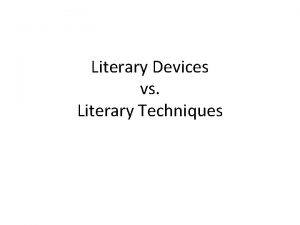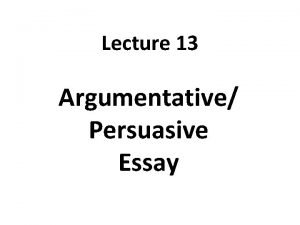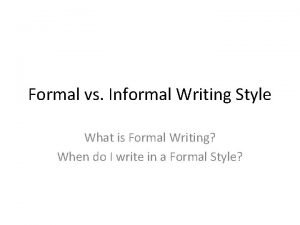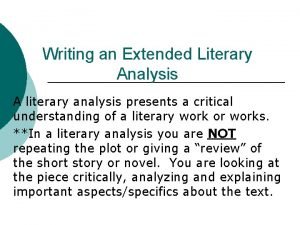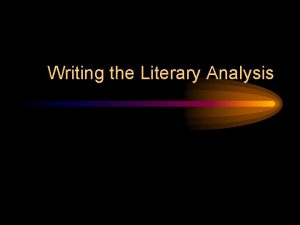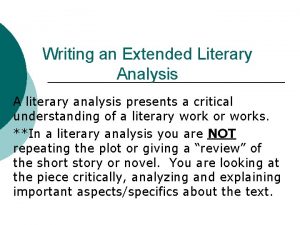Writing a Literary Analysis What is a literary









- Slides: 9

Writing a Literary Analysis

What is a literary analysis? It’s literary. It’s an analysis. It’s— An Argument! What is being analyzed? http: //www. youtube. com/watch? v=c 6124 S 72 jps

The Basics: § § § § § Plot Setting Conflict Theme Characterization Narration/point of view Symbol Figurative Language Irony/ambiguity Structure

How is it literary? Usually, a literary analysis will involve a discussion of a text as writing, thus the term literary, which means “having to do with letters. ” (greek/latin root lit, litera = letters) This will involve the use of certain concepts that are very specifically associated with literature. Metaphor? Setting?

An analysis of a literary work may discuss: § How the various components of an individual work relate to each other. § How two separate literary works deal with similar concepts or forms. This is what we see on PARCC! § How concepts and forms in literary works relate to larger aesthetic, political, social, economic, or religious contexts.

Writing an Argument: • When writing a literary analysis, you will focus on specific attribute(s) of the text(s). • When discussing these attributes, you will want to make sure that you are making a specific, arguable point (thesis) about these attributes. • You will defend this point with reasons and evidence drawn from the text.

Thesis Statement A thesis statement will directly relate to the task you are assigned in the prompt!!! Let’s practice:

How to Support A Thesis Statement Evidence and Support: • Include examples from the text: § Direct quotations § Summaries of scenes § Paraphrases • Always remember to read closely and annotate/highlight useful passages and quotes to use in your essay.

Format Introductory Paragraph • Hook/Attention Grabber • Thesis statement (Task & Titles) • Similarity between the two texts Body Paragraph 1 _Text 1 • Topic sentence using task and title of Text 1 • Text evidence to support claim • Explanation of how text evidence relates to claim Body Paragraph 2 –Text 2 (repeat bullets from Text 1) Conclusion • Restate thesis using titles and task • Add your own thoughts/conclusions in one or two sentences
 Similarities of journalism and literature
Similarities of journalism and literature Common literary devices
Common literary devices Literary writing
Literary writing Literary writing
Literary writing Narrative writing quiz
Narrative writing quiz Academichelp.net essay
Academichelp.net essay Formal and informal style in english examples
Formal and informal style in english examples Examples of informal writing style
Examples of informal writing style Academic writing and technical writing difference
Academic writing and technical writing difference Argumentative essay vs persuasive
Argumentative essay vs persuasive

